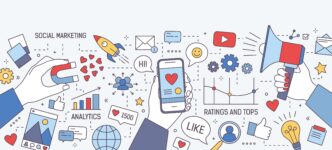
The Impact of Social Media Marketing on Business Growth
In the digital age, social media has become an indispensable tool for businesses aiming to enhance their growth and visibility. Platforms like Facebook, Instagram, LinkedIn, and Twitter offer unique opportunities to connect with audiences, build brand loyalty, and drive sales. This blog delves into how social media marketing (SMM) contributes to business growth and why it’s essential for modern enterprises.
1. Enhanced Brand Visibility and Recognition
Social media platforms provide businesses with a vast audience reach. By consistently sharing engaging content, companies can increase their brand’s visibility and recognition. For instance, companies that actively post and interact with followers often experience higher brand recall and customer trust.
2. Cost-Effective Marketing
Traditional advertising methods can be expensive, especially for small businesses. In contrast, social media marketing offers a cost-effective alternative. Creating and sharing content on platforms like Instagram or Facebook can be done with minimal expenses. Moreover, paid advertising on these platforms allows businesses to set budgets that align with their financial capabilities, ensuring efficient use of resources.
3. Targeted Advertising

One of the significant advantages of social media is its ability to target specific demographics. Platforms like Facebook and LinkedIn offer advanced targeting options, enabling businesses to reach their ideal customers based on factors like age, location, interests, and behavior. This precision ensures that marketing efforts are directed toward the most promising prospects, leading to higher conversion rates.
4. Improved Customer Engagement
Social media facilitates direct communication between businesses and their customers. By responding to comments, messages, and reviews, companies can build stronger relationships with their audience. Engaging with customers not only fosters loyalty but also provides valuable insights into their preferences and needs, allowing businesses to tailor their offerings accordingly.
5. Real-Time Analytics and Insights
Social media platforms provide businesses with real-time analytics, allowing them to monitor the performance of their content and campaigns. Metrics such as engagement rates, click-through rates, and conversion rates offer valuable insights into what resonates with the audience. This data-driven approach enables businesses to make informed decisions and optimize their marketing strategies for better results.
6. Lead Generation and Sales Growth
Social media platforms are effective tools for lead generation. By sharing compelling content and utilizing features like lead forms and call-to-action buttons, businesses can capture potential customers’ information. Furthermore, platforms like Instagram and Facebook have integrated shopping features, allowing businesses to sell products directly through their social media profiles, streamlining the purchasing process for customers.
7. Building a Community and Brand Loyalty
Beyond transactions, social media allows businesses to build communities around their brand. By sharing behind-the-scenes content, user-generated content, and engaging in conversations, companies can create a sense of belonging among their audience. This sense of community fosters brand loyalty, as customers feel more connected to the brand and are more likely to advocate for it.

8. Competitive Advantage
In today’s competitive market, having a strong social media presence can set a business apart from its competitors. By monitoring competitors’ activities and staying updated with industry trends, businesses can identify opportunities and threats, allowing them to adapt and innovate accordingly. Additionally, a robust social media strategy can position a brand as an industry leader, attracting more customers and partnerships.
9. Crisis Management and Reputation Building
Social media serves as a platform for businesses to address issues and manage crises promptly. By responding quickly and transparently to customer concerns or negative feedback, companies can demonstrate their commitment to customer satisfaction. Effective crisis management on social media can turn potential setbacks into opportunities to build trust and enhance the brand’s reputation.
10. Global Reach and Market Expansion
Social media transcends geographical boundaries, allowing businesses to reach a global audience. By tailoring content to different cultures and languages, companies can expand their market reach and tap into new customer bases. This global presence not only increases sales opportunities but also enhances brand recognition on an international scale.
Conclusion
Social media marketing has become an essential component of business growth strategies. From enhancing brand visibility to fostering customer loyalty, the benefits are manifold. By leveraging the power of social media, businesses can connect with their audience, drive sales, and stay ahead in the competitive market landscape. Embracing social media marketing is not just an option; it’s a necessity for sustained business success in the digital era.








